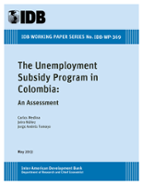The Unemployment Subsidy Program in Colombia: An Assessment
Date
May 2013
This paper assesses the effects of the Colombian Unemployment Subsidy (US), which includes benefits as well as training for some recipients. Using regression discontinuity and matching differences-in-differences estimators, the study finds that participation in the labor market, earnings of beneficiaries, and household income do not increase, and for some populations decrease during the 18 months after leaving the US program. Enrollment in formal health insurance falls. Effects on male heads of household include reductions in their earnings, decreases in their labor participation, and increases in their unemployment rates. The study also finds a small though statistically significant positive effect on beneficiaries¿ school attendance, but none on their children¿s weight or height at birth. The results are sensitive to the type of training that beneficiaries receive. Overall, the program serves more as a mechanism for smoothing consumption and providing social assistance than for increasing labor market efficiency.



